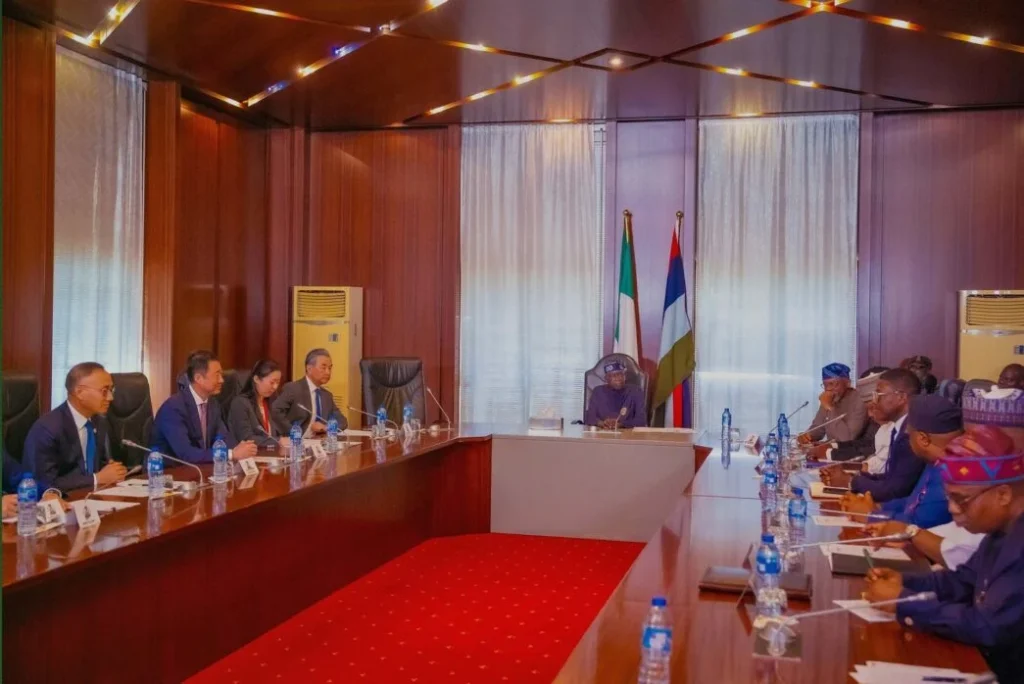China has pledged to strengthen financial ties with Nigeria by expanding the existing currency swap agreement and supporting the issuance of Panda Bonds, to boost trade and infrastructure development between the two nations.
Recently, China and Nigeria renewed their currency swap agreement, valued at 15 billion yuan (approximately $2 billion), to enhance trade and investment between the two nations. The agreement, valid for three years, aims to strengthen financial cooperation and promote the use of both currencies in bilateral transactions.
Speaking during a joint press briefing with his Nigerian counterpart, Ambassador Yusuf Tuggar, at the Presidential Villa in Abuja on Thursday, China’s Foreign Minister, Wang Yi, announced his government’s support for Nigeria’s request to increase the currency swap line and Nigeria’s plan to issue Panda Bonds.
Wang Yi, who met with President Bola Tinubu earlier on Thursday, described the plans as part of a broader commitment to enhancing financial cooperation with Nigeria.
“The currency swap agreement shows how well we have carried out our financial cooperation and sustained its momentum. Regarding Nigeria’s request to increase the currency swap line, we will study the issue favourably. Our cooperation is progressing well in many areas, including finance”, he said.
Wang Yi also said the Panda bonds would provide Nigeria with a reliable source of revenue and assured safety through Chinese financial backing.
Panda bonds are renminbi-denominated debt securities issued by non-Chinese entities in China’s domestic bond market, offering foreign governments and corporations access to China’s vast investor base.
“Our cooperation is going well in many ways, in terms of finance. For instance, we welcome the Panda Bonds to be issued. We welcome Nigeria to issue Panda Bonds in China because we have full confidence in Nigeria’s credibility. By issuing Panda Bonds, Nigeria will gain good revenue and safety is guaranteed through financial support”, Wang Yi added.
Beyond financial cooperation, China reaffirmed its role in Nigeria’s infrastructure development, particularly in railway modernisation.
Wang Yi highlighted the completion of the third phase of Nigeria’s railway modernisation project, financed by Chinese banks, as an example of their shared progress.
“Just a few days ago, Chinese banks supported the building of phase three of the railway modernisation project, which has now been delivered. Projects like the Kano-Kaduna railway demonstrate our commitment to Nigeria’s infrastructure development”, he said.
Wang Yi also hinted at China’s support for Strategic partnership with Nigeria and other African countries to strengthen peace and security of the continent, noting that China will train 6,000 military personnel and 1,000 police officers for African countries
He said, “At the FOCAC in Beijing Summit, President Xi Jinping announced six propositions and 10 partnership actions for China and Africa to jointly advance modernization and peace and security are an important part of it.
“China would like to work with Africa to deliver on the global security initiative in Africa and together achieve a modernisation featuring peace and security and build an all-weather, China-Africa community with a shared future for the new era.
“China will firmly support Africans in addressing African issues in the African way. African people are the real masters of this continent. They have every wisdom, capability and right to resolve their own issues.
“China opposes foreign interference in the internal affairs of African countries. Firmly supports the African Union and the sub-regional organisations in playing a constructive role, supports major African countries in strengthening their leading positions and promotes the resolution of disagreements and disputes through dialogue and consultation and the settlement of hotspot issues through the political way.
“China will firmly support Africa in strengthening peace and security capacity building. We will work with Africa to establish a partnership for implementing the Global Security Initiative, or GSI, and make it a fine example of GSI cooperation.
“We will work to advance the partnership action for common security and provide 1 billion yuan of grants in military assistance to Africa and help train 6000 military personnel and 1000 police and law enforcement personnel for African countries.
“China will also continue to support the building of the African standby force and the rapid response forces and support African countries in carrying out counter-terrorism peacekeeping operations. China will firmly support Africa in safeguarding its legitimate rights and interests, practising true multilateralism and not letting power politics and bullyism find their place in Africa.
“At the United Nations Security Council, China’s vote will always go to Africa, and we will continue to speak up for the legitimate voice of African countries in the multilateral arena. As the second largest contributor to peacekeeping operations, China will continue to support the United Nations in carrying out peacekeeping operations in Africa.
“China supports Nigeria in rallying countries in the region to achieve strength through unity, to build synergy through reconciliation, and to promote security through cooperation, in order to achieve peace and stability in the region, and China would like to make its contribution to the best of its ability to that end.”



